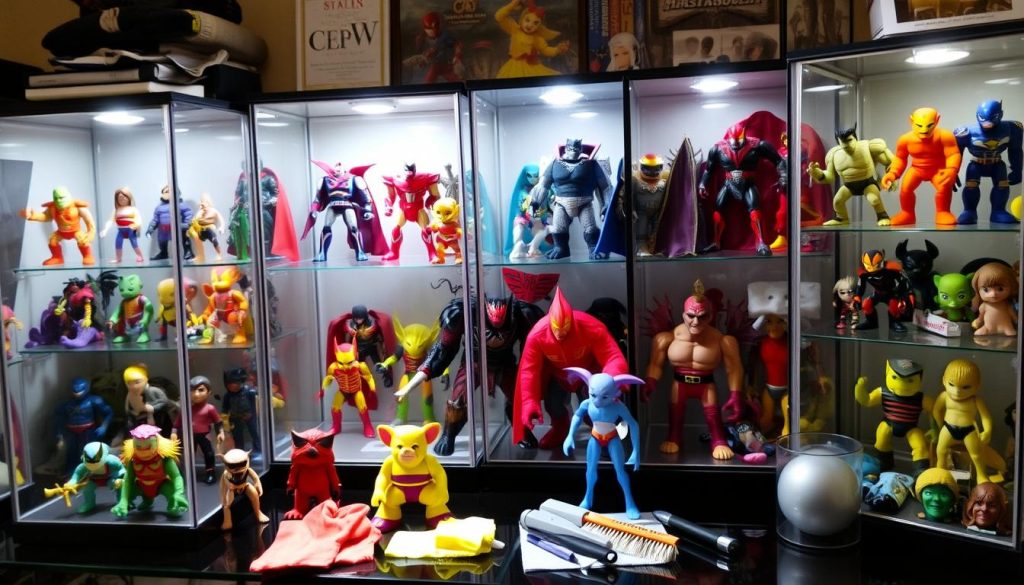Toy collecting is a serious hobby. Protecting your treasures from dust and damage is key. Whether they are old Star Wars toys or new Funko Pops, knowing how to keep them safe is important.
This guide will discuss threats to toy collections. It offers tips on how to avoid damage. By taking steps to care for your toys, you can keep them looking new.
Key Takeaways
- Understanding the risks of dust and physical damage to toy collections
- Importance of proper toy preservation methods
- Proactive measures to maintain toy appearance and value
- Practical suggestions for preventing toy damage
- Comprehensive toy safety tips for collectors
Understanding the Importance of Toy Protection
Toy protection is crucial for collectors who want to keep their collections safe and valuable. Ignoring this can cause permanent damage and reduce their worth.
Why Proper Care Matters
Proper care keeps toys looking new over the years. It helps maintain both their beauty and usefulness. Toys that are well cared for can become expensive collectibles or treasured family items.
The Impact of Dust and Damage on Value
Dust and damage can lower a toy’s value. Dust can make colors fade and materials break down. Scratches and marks can make a toy less valuable by hurting its look and function. A collection that’s well-kept is priceless in many ways.
Common Misconceptions About Toy Preservation
- Many think toys can’t be destroyed. But most toys can get ruined without proper care over time.
- People wrongly assume all toys age the same. Different materials like plastic and fabric wear out differently and need special care.
- Some believe any storage works fine. Yet, toys can be badly damaged by the wrong humidity or temperature.
Knowing these false beliefs helps in planning the best ways to keep toys in great shape for a long time.
Optimal Storage Solutions for Toy Collections
To keep your toy collection looking new, you need the right storage. Choosing good display cases and keeping them in a climate-controlled space helps a lot.
Choosing the Right Display Cases
Picking the right display cases is crucial for toy storage. They keep your toys safe from dust and damage while showing them off. Good cases ensure your toys stay in top shape.

Benefits of Climate-Controlled Environments
Using climate-controlled storage is also vital. It keeps toys safe by keeping the temperature and humidity stable. This is especially important for old or fragile toys.
Avoiding Direct Sunlight and Humidity
Keep your toys away from sunlight and too much moisture. Sunlight can fade and discolor them, and moisture can cause mold and damage. Use dehumidifiers and store away from windows to help maintain their condition.
| Storage Solution | Benefits |
|---|---|
| Display Cases | Protects from dust and physical damage |
| Climate-Controlled Storage | Prevents temperature and humidity-related damage |
| Avoiding Sunlight | Prevents fading and discoloration |
| Avoiding Humidity | Prevents mold growth and structural damage |
By using these storage methods, your toy collection will last longer and stay valuable. Display cases, climate control, and avoiding sunlight and moisture are key.
Best Practices for Cleaning and Maintenance
Keeping your toy collection in top shape is key to protecting their look and value. A good care routine for toys includes regular cleaning and taking preventive steps for their lasting beauty. Here are the top tips and instructions to help you maintain your collectibles in perfect shape.
Recommended Cleaning Supplies
Certain supplies are vital for proper toy upkeep. Based on what your collectible is made of, you might need:
- Microfiber cloths for gentle dusting
- Compressed air cans for hard-to-reach areas
- Soft-bristled brushes for detailed parts
- PH-neutral cleaning solutions for plastic, metal, or fabric toys
- Distilled water for a mild rinse
Step-by-Step Cleaning Process
To avoid harming your collectibles, follow a careful cleaning routine. Here’s a simple guide:
- Dusting: Start by removing surface dust using a microfiber cloth or a soft brush.
- Deep Cleaning: For a detailed clean, mix a PH-neutral cleaner with distilled water. Use a damp cloth to wipe your toy gently.
- Drying: Dry your toys fully with a clean cloth to prevent spots or mold.
- Final Touches: Use compressed air for tough spots and make sure everything’s dry.
Frequency of Maintenance
How often you clean your toys depends on where they’re kept and their type. Generally, follow this schedule:
- Weekly: A quick dust-off for items on display.
- Monthly: A detailed clean for toys you handle often.
- Biannually: A thorough clean for everything, even toys in storage.
By following these guidelines for toy upkeep, your collectibles will stay looking great for many years.
Essential Tools for Toy Protection
To keep your toy collection in top shape, it’s critical to use the right protective tools. This includes special protective cases, desiccants for controlling humidity, and devices to monitor temperature.
Protective Cases and Covers
Keeping your toys safe means using protective cases and covers. Companies like Ultra PRO and BCW make various types of cases. These fit different toys, like action figures and vintage dolls. Cases protect from physical harm and keep dust out. This helps toys last longer and keeps their value.
Desiccants and Humidity Control
Managing humidity is key to preserving your toys. Desiccants, like silica gel packets, help by soaking up extra moisture. Put these packets in your storage boxes or display cases. They keep humidity at the right level, stopping mold and damage to materials.
Temperature Monitoring Devices
Toys can be damaged by changes in temperature. This affects materials such as plastic and paint. Devices that monitor temperature help keep the environment steady. ThermoPro and La Crosse Technology make good ones that can warn you about temperature swings. They help keep your toys looking brand new.
| Tool | Function | Benefits |
|---|---|---|
| Protective Cases and Covers | Physical Protection | Prevents dust and contaminant exposure, sustains toy longevity |
| Desiccants | Humidity Control | Maintains appropriate humidity levels, prevents mold |
| Temperature Monitoring Devices | Temperature Regulation | Ensures stable storage temperatures, protects toy materials |
Long-Term Care Strategies for Toy Longevity
To keep your toys looking new, you need good care strategies. Check your toys often, keep detailed records, and sometimes get help from pros. Doing these things will help keep your toys great for years to come.
Regular Inventory Checks
It’s important to check your toys regularly. Look for any dust, damage, or wear. Fixing small issues quickly can help your toys last longer. Also, make sure they’re stored right by checking them often.
Documenting Your Collection
Keeping detailed records of your toys is key for insurance and passing them on. Make a catalog with descriptions, photos, where you bought them, and their values. This helps track their worth and protects them if they get lost or damaged.
When to Seek Professional Restoration Services
Sometimes, you need a pro to fix your toys, especially if they’re very special or expensive. Toy restoration experts can fix toys that you can’t on your own. Getting help from pros can make your toys last longer and keep them looking good. Knowing when to get this help is part of taking care of your toys well.

